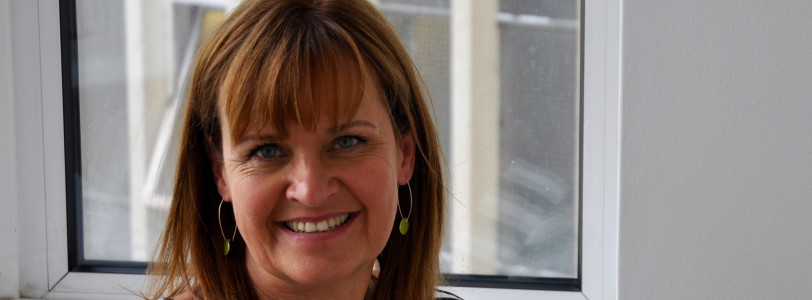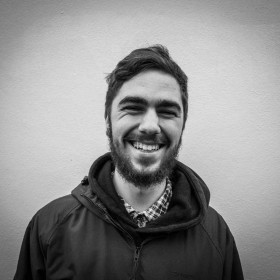Tell us the history of CTS, and what you do there?
About 23 years ago, a group of volunteers working with the council noticed that there was a lack of day centres for people who were homeless, so the Clock Tower Sanctuary (CTS) was set up. At first, volunteers offered a place to come and have a cup of tea and a chat. Since then, we have expanded the services but still provide a safe space, and space for people to do everyday things such as have a cup of tea, have a shower, get dressed, make lunch, answer their emails, charge phones and have an address.
What does CTS aim to provide?
CTS works with young people who are homeless or insecurely housed, through a variety of support and interventions, ensuring that they don't become a part of the long term homeless population. Our ages range from 16-25years and in Brighton or Hove – we have an open door policy and work with those who want our help.
We are currently reviewing our strategy and are clear that if a young person becomes homeless in Brighton, we want their experience of homelessness to be brief, non-recurring and supported.
Of the services that we offer now, it's to help young people meet both their crisis, practical needs as well as supporting people into employment, supporting their health and wellbeing and education, and improving their employability. We are very much about building a community, ensuring that we provide an open and equitable experience, focusing on equality and diversity. Since we have started doing that work in particular, we have seen an increase in young people from LGBT backgrounds. We are seeing more women and sadly more 16-18 years olds coming to us. We are focussed on cultivating an environment where people feel comfortable coming to us. Our team is incredible and we currently have around 25 volunteers that all have a real affinity for those who they help.
Young people can feel fragile, being in a city where housing prices are rising exponentially. The average wage is above the national average and the demand for housing is pushing out those with low incomes and poor employment prospects.
What are your favourite parts of working at CTS?
I think that the young people themselves are incredible: resourceful, energetic, hopeful; that is my favourite part of the job. I think that the team working on the frontline do a fabulous job of building that sense of community and encourage people to look after themselves first, and then look after each other. I suppose the happiest situation for me is when someone comes back after two or so years and says that because of us, they have turned their life around. When they say that they are housed, are in a stable relationship, are employed and are happy within themselves it makes it all worth it. When people who we have helped then ask, ‘What can I do for you? I want to volunteer’, that is one of the most fulfilling conversations that we can have.
What are the hardest parts about working at CTS?
I think the hardest part of the job is the feeling of pushing a cart up a hill, in terms of national policy. There are many things that cause a young person to become homeless, some start even before they are born, for example when a child is born into a family that is struck by poverty or dysfunction, the likelihood of them becoming homeless is high.
We are not, and maybe never will be, at a point where we won't be needed. We work to raise awareness, but government policy and spending plans just don't correlate with what needs to be done. One of our goals is to challenge inequality and prejudice: we do this for individuals but also work to challenge systemic inequality: however, we are a small organisation with finite resources.
What is the most detrimental to future life for young homeless people?
I think one of the biggest things is a sense of disconnection.
Most people that come to us don't have the support of family or friends, so they don’t have access to resources that such relationships provide. Family breakdown is such a key factor in youth homelessness and if you become disconnected from the people who may have known you your whole life, it can be incredibly hard to get back on track.
With the basic practicalities of being on the street or having to sofa surf, often there is a fear of exploitation and sexual exploitation. People's health needs go unchecked, whether that be physical, mental, emotional or psychological as their health starts to deteriorate. Substance abuse can increase with homelessness.
Life on the street can be dangerous for a homeless young person and we are conscious that a young person’s gender, sexuality, ethnicity and health needs can make things much harder.
What does CTS do to try and help those who are having issues with substance abuse/ mental health problems?
As a very small team, we work with up to 50 partners. We work with a young person to identify where they would feel the most comfortable finding help from. In the cases of drug or alcohol abuse, there are several organisations in Brighton and Hove that could support them and we are able to give them the options. That could involve giving them a phone number, making a referral or accompanying them to an appointment.
Some young people come to us three or four times and they might only need that one thing put into place. We help young people claim their benefits, get references for suitable housing and sometimes after that help, they are then on their way. Other people could be with us for years – it’s not quite a ladder, rather more a game of snakes and ladders.
One of the challenges post-pandemic is that other services are closing their doors or raising their thresholds. This means that it can be much harder to get young people the help that they need. It is a very current challenge for us that we are still having to wrestle with, and it is something that people need to be campaigning about.
How much can mental health influence homelessness?
Mental health issues are definitely linked with homelessness, especially if a young person has experienced trauma or neglect as a child or teenager. Young people with mental health issues are much more likely to leave school early, are less likely to have qualifications, work experience, and cannot complete apprenticeships – which is the government’s ‘knight in shining armour’ that is going to rescue all those that are unemployed. Apprenticeships are hard to find and they are hard work; without a support network, it is difficult to find success doing them, therefore future employment and education options are greatly reduced.
We allow young people to use our address as their address, so they can register for benefits or with health services. We have a fantastic GP surgery in Brighton called Arch Healthcare and they are a great example of one of the brilliant partnerships that we have. We are not health experts, we do know a little about screening people, but we work with the experts to help with specific needs. The address we give can also help people to register for a bank account too, we aren’t a house or a home, but we are a fixed point in their lives that they can use as some kind of foundation.
That sense of place is very strong within the young people we see. For instance, during the pandemic, we were closed, and the feedback was that they were devastated about not having a place to come and get food or see a friendly face. Because of the ‘Everyone In’ strategy, people were placed in accommodation during that time, but it wasn’t always suitable or even local. Young people were physically and emotionally disconnected from their friends and colleagues, it was an incredibly difficult time for them.
Have you been busier post-pandemic?
The people made homeless during the pandemic were covered by the ‘Everyone In’ strategy, but that hasn’t always lasted. Some young people were given long term housing, whereas others were not. Those who are becoming homeless or experiencing difficulty now are not being automatically housed. We’re working with the same number of people as we did before, but many of those that were with us before the pandemic are still needing our services, but in a different capacity.
The young people we are working with now are experiencing entrenched, complex difficulties: for some this makes it hard for them to sustain their accommodation. Sometimes the accommodation provided is unsuitable for them as individuals.
Do you know if any students have come through your doors?
We do have people from universities and colleges, as well as those who may have dropped out of their courses for all kinds of reasons, and they can no longer fund their accommodation.
We also have a significant number of people who are homeless or insecurely housed and working. They might come to CTS for a shower and store their work clothes in a locker. There's this idea that young people who are homeless are reckless, and that is misplaced.
Do you feel that enough is being done within Brighton?
I think yes and no, we have an active housing department and an active homelessness team but there is only so much that they can do. Their hands are tied by the funding from the government. There's definitely a huge need for affordable housing to be built. The local authority is investing in housing specifically aimed at homeless people, in a scheme called ‘Housing First’, which originally comes from Nordic countries and their theories. The model enables people to be housed first and then given help to deal with the other things that are going on. This model can provide stability in terms of housing and give the space to address the other issues, so the investment into ‘Housing First’ is great.
Caroline Lucas, one of our local MP’s, is phenomenal. She is incredibly motivated about housing homeless young people, and she keeps in really good touch with us. There is so much on her plate, but during the first month of the pandemic, her team contacted us and asked what they could do. We had a great couple of meetings with her through Zoom. Our local council is very active and wants to address the issue of youth homelessness.
There is awareness amongst the local councillors and many of them are very motivated to do what they can to tackle homelessness. Of course, all local politicians are bound by national party politics and so for some, those national policies only provide limited support to tackle the homelessness crisis. It's tough for those making decisions against a backdrop of competing priorities and the post pandemic debt.
What do you think is Brighton’s overall societal view of homelessness? What can people do to help?
I think that the people of Brighton are more aware than other places might be of their homelessness issue. I think that there's a level of comfort that people here feel talking to those who are homeless and people definitely want to know what they can do to help.
Quite often I have people ask me what they should be doing, how they should act, should they give money? Personally, I am conflicted about giving money: it’s my belief that it is better to give support to organisations that are out there helping those in need, to give people a broader range of support networks.
A colleague of mine is the chief executive of the Brighton Housing Trust, he would say, “no one needs to be homeless, no one needs to be hungry on the streets of Brighton. There is so much support, so much food, it's just a matter of hooking these people up to the support that is available.” I think there is a huge variety of organisations within the city, be it charities, churches, schools, political groups or campaigners.
It is shameful that we are one of the richest countries in the world, and yet we have rising rates of homelessness, child poverty and mental health problems. What I would say to people who want to do something about these issues, is that they should get involved in one of the organisations that are out there, it could be through fundraising or volunteering. People need to gain that basic awareness of what help is out there.
Even just talking to those on the streets can be extremely beneficial. Simply asking a homeless person their name, what help that they are getting and what help they might need on a personal level can help tonnes. They are all individuals, people will say “the homeless of Brighton” – well that term includes hundreds of individual people who are struggling. I think the lack of ability to be able to see them as an individual and indeed as human beings is obviously detrimental. I will always say to people, go up to a homeless person, introduce yourself, ask their name and their story. Loneliness is a killer, and young people are so impressionable, they are still learning, and the isolation does them no favours.
Editor's note: This article was updated 8 November 2021.









0 Comments